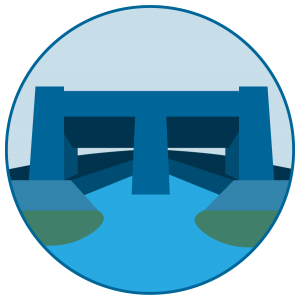How the FM Area Diversion Comprehensive Project Will Work
The project will provide a permanent solution to protect our communities by using an innovative approach to divert excess water around the metro area during significant flood events.

Levees and Floodwalls
As water comes from the upper parts of the drainage basin, including the Red River and tributary rivers, it passes through the natural riverbed, which is bordered by in-town levees and floodwalls. If there is the possibility the flood level will be more than 37 feet, the MFDA will prepare to operate the FM Area Diversion.

Control Structures
Radial-arm flood gates on the Red River Structure and Wild Rice River Structure are lowered to limit the amount of floodwater that enters the metro area, allowing no more than 37 feet of water to move through town in the Red River.
Southern Embankment
A portion of floodwater is stored behind the 22-mile southern embankment in the upstream mitigation area.

Diversion Inlet
Gates open on the Diversion Inlet Structure south of Horace, North Dakota, allowing floodwater to enter the stormwater diversion channel and safely pass around the metro area.

Post-Flood Cleanup
Once project operations end, cleanup begins. The MFDA will remove flood-related debris from the upstream mitigation area, which will experience overland flooding during project operations. Details on planned cleanup activities are in the mitigation plan.
Project Components
Get more details about the stormwater diversion channel, southern embankment and other elements of the project.
